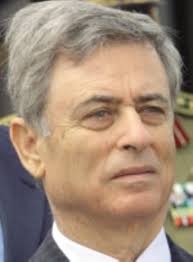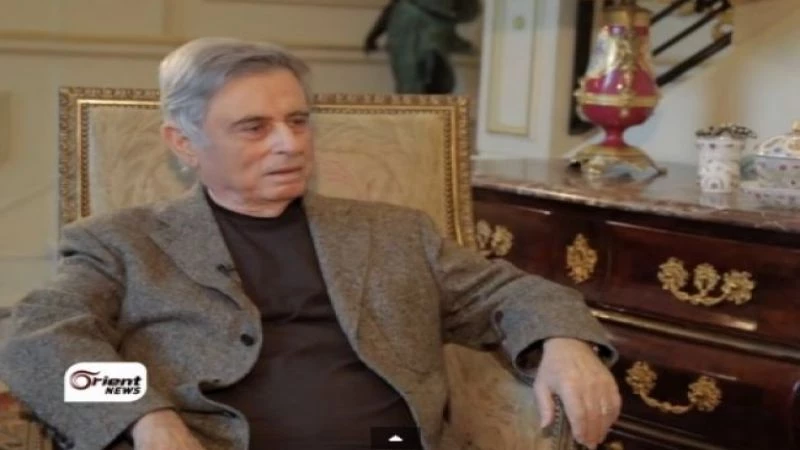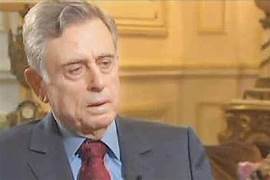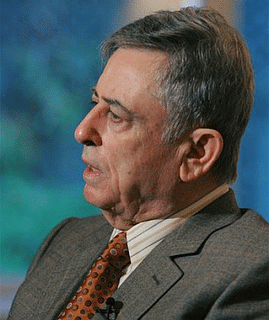Who says that Abdel Halim Khaddam has exhausted all his resources? Who believes that the former Vice President of Syria has conveyed all his intended messages through the media he has chosen thus far? Who can be certain that the former official responsible for the Lebanese dossier isn’t preparing for another appearance, as some anticipate? From his residence in the upscale Foch neighborhood of Paris, Abdel Halim Khaddam continues to divulge crucial information. While it is possible to ascertain what he has chosen to disclose through the media, his testimony before the International Commission of Inquiry on the assassination of Rafik Hariri is now available to Judge Serge Brammertz, who has succeeded Detlef Meles as the head of the International Commission of Inquiry. In fact, he is prepared to testify before any court as a witness.
What is Abdel Halim Khaddam seeking to achieve through all of this? Does he have aspirations for a future position? He dismisses any personal motives and states, “Everything I do is for the sake of Syria and its people, to free them from the burden of a regime that oppresses them.”
Do his words absolve him of any responsibility for the mistakes that have occurred? Abdel Halim Khaddam nostalgically remarks that during the reign of the late Hafez Al-Assad, the Lebanese dossier was managed with a political perspective, aiming to maintain the unity of the two negotiation tracks with Israel. However, Bashar Al-Assad transformed the dossier into a purely security matter, with security service officers overseeing affairs in Lebanon.
At the outset of our conversation with Ilaf, we inquired about the appropriate title we should address him with. Should it be in the past tense: “His Excellency, the former minister,” or “Mr. former Vice President”? Or should it be in the future version: “Mr. substitute president” or “His Excellency, the next prime minister”?
He responded by explaining, “I served as vice president, and nobody removed me from my position. I made the choice to resign and publicly announced it last June during the Qatari conference of the Arab Baath Socialist Party. My resignation was a reflection of my objection to the internal and external political approach of Bashar al-Assad’s regime and the clique surrounding it. These policies have inflicted damage upon Syria in the political, economic, and social spheres, plunging the country into a lamentable state, experiencing unprecedented suffering throughout its long history.”
Regarding his current and future endeavors, Abdel Halim Khaddam states, “I am not seeking personal gain. What matters to me is the future of my country and its people. All my efforts are dedicated to saving Syria from a regime that oppresses it, hindering its progress and preventing it from assuming national responsibilities, which Syria has always been at the forefront of defending. My focus is on advancing the interests of Syria and its people. I am fully committed to this mission and ready to collaborate with all forces within the Syrian people, working towards instigating changes and establishing a democratic system that ensures the rotation of power through elections.”
Q: You advocate for a unified opposition comprising all segments of the Syrian people. However, the “Muslim Brotherhood” has already rejected this call. Do you see yourself in a position capable of rallying the opposition?
A: I have come across such statements through the media, but I possess different information. My call is directed towards all sections of the Syrian populace, encompassing their diverse intellectual and political orientations. It is a call to save Syria, and it has received a response contrary to what some people claim. Presently, discussions are underway among representatives from political, intellectual, cultural, and social movements. The objective is to establish a unified and inclusive opposition that represents everyone. An opposition based abroad will strive for transformation from within through peaceful and democratic means. The era of coups is behind us. We do not advocate employing the military or armed forces to bring about change. Our foremost goal is to safeguard Syria. Once the opposition’s formation progresses, the outcomes will be announced, followed by a widespread popular movement within the country.
I will soon return to the country once the change is accomplished because the dawn of Syria will rise shortly.
Q: Does this imply that you will declare civil disobedience?
A: The decision has not been finalized yet. We are currently in the process of establishing an opposition, and as I mentioned, there are extensive consultations on this matter. The subsequent steps regarding practical actions will be deliberated among the Syrian leaders. I emphasize “Syrian leaders” because our movement is solely Syrian, and there are no external influences managing it.
Q: Who effectively rules Syria? Is it Bashar Al-Assad or the so-called old guard?
A: There is no distinction between an old guard and a new guard in Syria. If I am considered part of the old guard, then I have resigned. As for the one who holds practical authority in Syria, it is Bashar Al-Assad himself. He bears responsibility for all decisions made.
Bashar Al-Assad, along with his close family members, effectively manages the country, and no other party holds the reins of power. The government functions ceremonially, with the president having no real authority. Instructions come directly from President Bashar or his secretary. The party leadership is merely a facade, following Bashar’s directives. The People’s Assembly is ineffectual, lacking any real power. Bashar Al-Assad has crippled institutional work, turning them into shields to hide behind whenever it suits him. He personally shoulders responsibility for all decisions issued by state institutions. The people will hold him accountable for his actions, and this reckoning is closer than some may anticipate.
Q: Do you believe that Bashar Al-Assad was unfit to assume power?
A: Yes, he was unqualified and lacked the qualities of a head of state. Since taking office, he has monopolized power, with no other influential forces in the country. There are no old guards, no new guards, and no functioning institutions.
Since assuming the presidency, he has wielded absolute power. One of the reasons for my disagreement with him is his tendency to make dangerous decisions without consulting the highest state bodies. These decisions have harmed Syria and its people, as well as affected Lebanon. For instance, the decision to extend President Emile Lahoud’s term had local and international consequences that placed both countries in a precarious situation. It strained relations between Damascus and Beirut and caused significant disagreement with many Lebanese leaders, even those who had been our allies for many years. The ill-advised extension decision ultimately resulted in the humiliating withdrawal of the Syrian army from Lebanon, surpassing even the defeat of 1967 in its gravity.
Bashar Al-Assad bears full responsibility for these mistakes and will be held accountable for them.
Q: However, when you made the extension decision, you were still in your position. Why did you agree?
A: I opposed this decision and advised the President against it, urging him not to proceed. I cautioned Bashar, emphasizing that he and Syria would not be able to bear the consequences of such a decision. The extension would bring great harm to Syria, Lebanon, and the President himself.
No one can bear the repercussions of such a decision in the face of the international community.
I informed him that the Lebanese people disliked Emile Lahoud and did not want him as President for another term. He assured me that he would not renew Lahoud’s mandate. However, a week later, the decision to extend was made. It is possible that the influence of the security services or certain family members played a role, driven by their personal financial and private interests.
Q: Do you believe that he had a misguided understanding of the international situation? You mentioned that the President is solely responsible for his decisions. How can you now claim that he was influenced by others?
A: There is no doubt that Assad lacks the ability to comprehend international and regional dynamics. He lacks knowledge of international affairs, global policies, and their impact on the region and Syria. Regarding the influence of certain parties on the President, I previously stated that he alone bears the responsibility for making decisions, and he alone determines the course of action and the resulting consequences. The extension decision may have been influenced by the opinions of some individuals who considered their own interests rather than the interests of Syria. Bashar Al-Assad was thus disloyal to the Constitution and its provisions. He showed little regard for the well-being of his people. He challenged both his people and the country’s constitution simultaneously.
Q: Why did I insist on choosing Lahoud? Are there no other figures close to Syria in Lebanon?
A: That is exactly what I asked Bashar Al-Assad. I questioned him, saying, “After thirty years of our presence in Lebanon, is there no other friend left for Syria besides Emile Lahoud? There are trusted and moderate individuals with whom we have a good relationship, and they also enjoy the support of the Lebanese people.”
Why did you favor Emile Lahoud? In my view, there were significant interests behind the decision to extend his term. In this context, I will mention the Lebanon Casino and Bank Al-Madina.
Q: Do you regret your decision to criticize the regime?
A: My only intention has been to benefit my country and bring it prosperity. I am now convinced that the current regime must step down because it has inflicted immense damage upon the country. Bashar Al-Assad treated the country as his personal estate, disregarded the functioning of institutions, and established a system that serves the interests of his family and their associates. Ten percent of them own more than what the state possesses.
What I am expressing now reflects the sentiment of the majority of the Syrian people. Syrians are echoing my words, but they do so privately. If the security threats and surveillance against them are lifted, and if prosecution of those who speak freely ceases, the people will openly express what I am saying now. Conversations in cafes and private gatherings revolve around injustice, corruption, and the absence of public freedoms. My words will one day contribute to the rebirth of Syria.
Q: Don’t you think that your words have weakened Syria’s international standing?
A: Bashar Al-Assad is not synonymous with Syria, and Syria is not solely defined by Bashar Al-Assad. A clear distinction must be made between the two. Bashar leads a faction that controls the interests of the country. Syria comprises the oppressed people who suffer from unemployment, are subject to humiliation by the security services, and have witnessed the looting of their resources.
Bashar Al-Assad will be held accountable for all the crimes he has committed against the country. I caution the security services against persisting in suppressing citizens.
Q: Who will prosecute him?
A: Those convicted by the International Commission of Inquiry into Hariri’s assassination will face trial before the Commission. Those convicted by the Syrian people will be tried in Syria after the change occurs.
Q: In what capacity did the investigation committee hear your testimony? Are you accused of withholding information about Meles?
A: The investigation committee heard my testimony as a witness, nothing more and nothing less. Was I involved in the decision to assassinate Hariri? Absolutely not. Does Assad participate in decision-making in Syria? Absolutely not. I provided him with advice on numerous matters, but he did not heed my counsel. I have written many memoirs for him, but he either did not read them or failed to comprehend their contents. He neither reads nor comprehends.
Nevertheless, I will soon write my memoirs, where I will reveal everything I know about this period and our presence in Lebanon.
Q: Why did you withhold this information?
A: Previously, no one asked for my opinion or the information I possessed. I did not offer my testimony to the investigative committee voluntarily. They requested to hear from me after I spoke on Al Arabiyah channel.
Q: Have you received threats? Have you sought protection from the French?
A: Bashar Al-Assad’s regime has committed murders and desires to physically harm me. However, this matter does not concern me nor alter my course. I will continue working towards the liberation and progress of Syria. Since my arrival in France in June, I have been under protection, and security measures have been implemented to safeguard me. I have not reached out to any French individuals, but now there is increased censorship due to concerns of an assassination attempt.
Q: What did President Hosni Mubarak inquire about during his supposed meeting with you last Friday?
A: I have not met with anyone. President Mubarak is an old friend, but he did not visit or meet with me. No one has approached me for a meeting.
Q: Did General Omar Suleiman, the head of Egyptian intelligence, meet with you?
A: Neither President Mubarak nor General Omar Suleiman. There has been no meeting between me and any Arab or foreign official, whether near or far, except for the International Commission of Inquiry, of course.
Q: President Bashar admitted to mistakes in Lebanon, including those committed when you were responsible for Lebanon’s file.
A: I will soon publish my memoirs about Lebanon, where I will reveal everything. I was against Lebanon’s dependency on Syria and the imposition of such dependence. Syria entered Lebanon to halt the war there, and that objective was achieved. Subsequently, the Taif Agreement was implemented, and Syria contributed to the reconstruction of the Lebanese army while disarming and dissolving the militias. However, I do not claim that there were no mistakes.
We had friends and allies in Lebanon who occasionally made errors. There were also Syrian officials who were in the wrong, but we took corrective measures and addressed those mistakes. There was no daily or political dominance over the situation in Lebanon. Syria’s primary focus during that period was to uphold the unity of the peace process and engage in negotiations with Israel. Otherwise, we entrusted the management of affairs to Lebanese institutions. Syria’s role revolved around resolving internal conflicts and restoring unity among the Lebanese.
However, things began to change when Bashar Al-Assad assumed responsibility for the Lebanese file in the 1990s, even before he became president. Prior to that, Lebanon’s affairs were managed through political means. With Bashar’s involvement, matters shifted towards military and security personnel taking charge. This marked a significant difference between the two scenarios.
Q: Let us also not forget the military character of the pre-Bashar Al-Assad phase. There have also been assassinations such as Kamal Jumblatt, Mufti Hassan Khaled, and others…
A: The circumstances surrounding these assassinations were different from the assassination of Rafic Hariri. Lebanon was engulfed in a civil war with various local and external actors involved. There were conflicting parties engaged in military activities and internal conflicts, even among individuals from the same social class. The situation was marked by a degree of chaos, leading to acts of physical elimination. Examples include the wars between forces led by Tony Franjieh and Eli Hobeika, as well as the conflicts between General Michel Aoun and Samir Geagea, and the War of the Camps involving Amal, the socialists, and the Almoravids. It was a chaotic period where control was lacking, allowing for the involvement of multiple parties. Therefore, attributing responsibility or casting suspicions on specific individuals or groups for these assassinations cannot be easily determined. However, it is important to emphasize that Syria cannot be held accountable.
Syria’s official policy was to denounce assassinations and refrain from interfering in such acts. It is absolutely implausible for any Syrian political official to have ordered or approved these assassinations. I have previously stated that prior to Bashar Al-Assad, Lebanon’s affairs were managed by politicians who rejected such acts of violence.
Regarding Kamal Jumblatt, I prefer not to discuss it at this moment. As for Sheikh Subhi Al-Saleh, he is one of my relatives. Would it make sense for there to be a conspiracy against my own cousin and relative? Sheikh Hassan Khalid was a dear friend and a highly respected individual. Would I ever agree to the killing of any of them? Absolutely not.
I would even go as far as to say that I would never agree to the killing of Kamal Jumblatt, who was a friend and a patriotic figure with whom we maintained friendly relations despite occasional political differences.
Q: So how is it possible that President Bashar Al-Assad knew about the assassination of Hariri?
A: As I mentioned earlier, the management of the Lebanese file was primarily in the hands of military, security, and intelligence personnel. It is my belief that Bashar Al-Assad has involvement in this matter, and it is the responsibility of the International Commission of Inquiry to investigate and establish the truth.
Q: Accusing the current ruling of corruption may also affect you?
A: Any accusations of corruption against me or any member of my family coming from entities associated with Bashar Al-Assad are part of a deliberate effort to harm my reputation. I am calling for an impartial Arab commission of inquiry to thoroughly investigate these allegations, and I challenge anyone to provide evidence supporting any charges of corruption.
Q: What about the Lebanese prisoners in Syria?
A: The issue of Lebanese prisoners in Syria does not fall within my realm of concern. My focus is on political matters, and I have no involvement in security issues.
Q: What is your message to President Bashar Al-Assad?
A: My message to President Bashar Al-Assad is clear: I urge him to step down from power and allow for the formation of a government that can bring about the salvation of our country.




